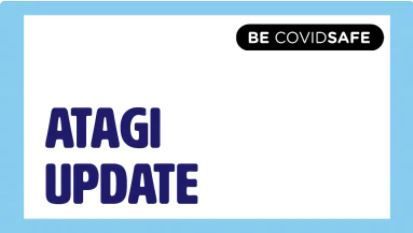
On Wednesday 1 December 2021 ATAGI reviewed the latest developments relating to COVID-19 and COVID-19 vaccine safety. In addition, ATAGI continues to monitor COVID-19 epidemiology in Australia including current COVID-19 outbreaks involving the Delta variant, including in New South Wales, Australian Capital Territory and Victoria.
ATAGI stresses that vaccination is a key public health intervention to prevent infection, transmission and severe disease due to SARS-CoV-2. ATAGI recommends COVID-19 vaccination for all Australians from 12 years of age.
ATAGI notes the lower but increasing vaccine coverage in Aboriginal and Torres Strait Islander populations and notes strategies to address barriers to vaccination in this important population.
As at 29 November 2021, over 39 million doses of COVID-19 vaccines have been administered in Australia. ATAGI has noted emerging national data demonstrating that only a small proportion of patients with severe COVID-19 were reported to be vaccinated, consistent with a high vaccine effectiveness against severe disease.
ATAGI has previously noted the Therapeutic Goods Administration (TGA) registration of Pfizer and Moderna for use in children from 12 years of age and supports COVID-19 vaccination in all adolescents from 12 years of age. These statements can be found in the Resources section below.
ATAGI also reinforces the importance of COVID-19 vaccine booster program. Adults who have completed their primary course of COVID-19 vaccines 6 or more months ago should receive a booster vaccine.
ATAGI are also watching data on the newly reported Omicron variant closely and have released a statement.
Comirnaty (Pfizer) and Spikevax (Moderna)
Myocarditis and/or Pericarditis
ATAGI continues to review and closely monitor reports of rare but potentially serious adverse events following immunisation with Pfizer, including myocarditis and/or pericarditis. These conditions can occur in the absence of vaccination and are also a recognised complication of COVID-19.
ATAGI notes that the TGA is investigating 2164 reports of suspected myocarditis and/or pericarditis following Pfizer and in particular 693 suspected myocarditis reports. Of these suspected cases, 354 cases of myocarditis or myopericarditis have been assessed as meeting the CDC case definition (level 1, 2, or 3), of which 238 cases occurred following the second dose.
ATAGI also notes that the TGA is investigating 37 reported cases of myocarditis following Moderna vaccine, of which 21 have been assessed as meeting the CDC case definition (level 1, 2, or 3). ATAGI are monitoring international data on the rates of myocarditis and pericarditis.
The TGA report detailing the estimated rate of myocarditis following first and second doses by age and sex is published weekly. The observed rates in Australia are consistent with international data. These data show a higher rate in younger individuals (particularly younger males) and following second doses. Most reported cases have been mild, self-limiting and have recovered quickly, although further follow-up of these cases is ongoing. ATAGI noted that a small number of cases were more severe, requiring hospitalisation.
In children 12-17 years, 137 cases of myocarditis have been reported following Pfizer vaccine, with the rate following first doses estimated a 6.8 per 100,000 doses in males and 1.4 per 100,000 in females. After second doses in this age group, the rate of myocarditis is 10.6 and 2.4 per 100,000 in males and females respectively. There is not yet sufficient data following Moderna vaccine (n=14) in this age group for a meaningful analysis.
ATAGI has this week again reviewed international data comparing the rates of myocarditis and pericarditis reported after Pfizer and Moderna vaccines. ATAGI notes evidence from some international safety surveillance systems demonstrating that the risk of myocarditis is higher, albeit still rare following Moderna compared with Pfizer (
While data on myocarditis following booster doses of Pfizer vaccine is limited, preliminary data from Israel on the use of Comirnaty as a booster dose suggests the risk of myocarditis with the booster dose is not increased, as compared with the risk after second doses of vaccine.
Risks and benefits
ATAGI reinforces that the benefits of vaccination with Comirnaty (Pfizer) and Spikevax (Moderna) strongly outweigh the risks of myocarditis and/or pericarditis for any age group. ATAGI recommends either vaccine in those eligible. ATAGI will continue to explore potential differences in the rates of adverse events by brand and consider updated advice in the future.
People who are receiving vaccination with Comirnaty (Pfizer) and Spikevax (Moderna) should be aware of this potential complication as part of providing informed consent. People should be made aware of symptoms of myocarditis and/or pericarditis and are encouraged to seek prompt medical attention.
Vaxzevria (AstraZeneca)
Thrombosis and Thrombocytopenia Syndrome (TTS)
ATAGI considered an update from the TGA on current confirmed cases of TTS and those under investigation. The latest TGA statement on TTS cases, including clinical outcomes, can be found here. ATAGI notes that scientific studies have suggested a potential mechanism where the AstraZeneca vaccine may cause TTS, and the implications of the findings are being considered.
ATAGI examined estimates of risk of TTS by age group in Australia and note that there have been 166 cases of confirmed or probable TTS (88 confirmed cases; 78 probable cases). To date around 13.5 million doses of AstraZeneca have been administered.
ATAGI notes that International data continues to demonstrate the risk of TTS following a second dose of AstraZeneca is much lower than the risk following a first dose (estimated internationally to be 2 per million second doses). ATAGI reinforces the importance of completing a two-dose schedule to ensure maximal protection, with the strongest evidence for two doses of the same brand.
Rates of TTS cases are based on first doses of AstraZeneca as of 18 November 2021 (to account for the time to onset of TTS). To that date, approximately 13.4 million doses of AstraZeneca have been administered, made up of around 6.9 million first doses and 6.5 million second doses.
Although estimates of risk based on small numbers of cases are imprecise, the risk of TTS is estimated in Australia at around:
- 2.5 per 100,000 in those
- 1.9 per 100,000 in those ≥60 years.
ATAGI notes that the TGA Weekly Report includes a breakdown of current rates by decade of age and a detailed breakdown of Australia’s confirmed and probable TTS cases weekly using the CDC Criteria. ATAGI noted these data suggest that the severity of TTS appears to be higher in younger women. These differences by sex are not seen in older people.
Outcomes have generally been better with early presentation and recognition of the symptoms and appropriate treatment as outlined in the TTS primary care guide. This may contribute to the lower-case fatality ratio observed in Australia compared to those reported internationally. The overall case fatality ratio in Australia (8/166;
Immune Thrombocytopenia
ATAGI continues to review and closely monitor reports of rare but potentially serious adverse events following immunisation with AstraZeneca, including Immune Thrombocytopenia (ITP). It is important for those vaccinated to be aware of some of the symptoms that may be associated with ITP, such as easy bruising and bleeding from the nose or gums.
ATAGI notes that following an investigation by the TGA, the AstraZeneca Product Information has been updated to include a warning about ITP. ATAGI also notes one fatal case that was assessed by an expert Vaccine Safety Investigation Group as being likely to be vaccine related.
Guillain-Barre Syndrome
ATAGI continues to review and closely monitor reports of rare but potentially serious adverse events following immunisation with AstraZeneca, including Guillain-Barre Syndrome (GBS).
It is important for those vaccinated to be aware of some of the symptoms that may be associated with GBS, such as muscle weakness, unusual sensation (numbness, pins and needles) and unsteadiness while walking. ATAGI notes this condition can occur in the absence of vaccination and that investigations into whether the reported events are causally linked to vaccination is ongoing.
ATAGI also notes that following rigorous investigations by the TGA and other international drug regulators, a clear link between GBS and AstraZeneca has not been established. However as a precautionary measure, warning statements about GBS have been added to the AstraZeneca Product Information in response to rare cases following vaccination.
Risks and benefits
ATAGI reinforces that the benefits of vaccination with AstraZeneca in preventing severe COVID-19 strongly outweigh the risks of adverse effects in all Australians ≥60 years.
From 1 October 2021, all Australians aged 12 and over, including those Australians aged 60 and over, are now eligible to receive a Pfizer or Moderna COVID-19 vaccine. This means older Australians can now choose the Pfizer, Moderna, or AstraZeneca vaccine.
Everyone can now book their Pfizer vaccine through GPs and state led vaccination hubs, and the Moderna vaccine through Pharmacies in each of the states and territories.
At this time, there is no update to the ATAGI statement from 17 June 2021 in relation to the use of AstraZeneca, except to note that further clarification has been provided in regards to its use in outbreak settings.
Resources
ATAGI recommends review of the following key resources:
Use of AstraZeneca and/or TTS
- the ATAGI/THANZ joint statement which provides information about TTS and reaffirms ATAGI’s previous advice regarding the safe use of AstraZeneca;
- the TTS primary care guide, which provides advice for providers on the consideration and management of suspected TTS cases, noting the importance of early presentation and recognition of TTS;
- the risk-benefit document, which provides advice to help consumers make informed decisions about the risks and benefits of AstraZeneca in different age cohorts and scenarios; and
- additional guidance on the use of COVID-19 vaccines in outbreak settings;
- response to NSW COVID-19 outbreak; and
- additional strategies to combat the risk posed by the Delta variant of concern.
Use of Pfizer and/or Myocarditis and/or Pericarditis
- ATAGI and Cardiac Society of Australia and New Zealand guidance on Myocarditis and Pericarditis after mRNA COVID-19 vaccines
- ATAGI statement regarding vaccination of adolescents aged 12-15 years; and
- ATAGI statement on the use of COVID-19 vaccines in all young adolescents in Australia.







